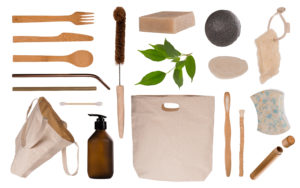When we go to the shops to buy some shampoo or cleaning supplies for our home, the environment may not exactly be the first thing on our minds as we consider which product to buy. Some of us are still making the switch to choosing eco-friendly products as opposed to others and we may not be living as green as we could be. This may be because of the restraints of time, budget or a touch of skepticism.
Using eco-friendly products helps to reduce pollution and contamination of the air, water, soil, and much more, as well as being better for us. So, how can switching to eco-friendly products be beneficial for you?
It’s good for your pocket
While eco-friendly products may be a little more expensive in comparison to the name brand products we are used to, they can actually be money-saving in the long run. Many items are made to last longer since they are produced from recycled materials, which are more durable and better quality.
Big companies are realising where consumers and customers’ priorities are and these prices are falling. For example, swapping to a green energy company doesn’t mean you have to spend a fortune on your bills like you once had to.
By purchasing eco-friendly products, you are telling the manufacturer ‘this is what I want to purchase, make more of it,’ which over time will lead to more green products being produced and less toxic ones.
The bottom line is, if you leave it up to someone else to purchase eco-friendly products, they will stay at the same heightened price and toxic products will continue to rule the shelves of all the big box department stores.
It’s better for your health
Not only are these products healthier for the environment, but they can also be healthier for you! A lot of products contain harmful chemicals that put us at risk of developing illnesses and diseases. Eco-friendly products eliminate all of these risks by using natural products and avoiding additives we are unaware of.
 Organic food is better for your body. In a study done on the difference between conventional food and organic food at Washington State University’s Center for Sustaining Agriculture and Natural Resources, important antioxidant compounds in fruits and vegetables, organic fruits and vegetables were found to deliver between 20 and 40 percent higher antioxidant activity. There was much less pesticide residue on organic foods, as you would expect.
Organic food is better for your body. In a study done on the difference between conventional food and organic food at Washington State University’s Center for Sustaining Agriculture and Natural Resources, important antioxidant compounds in fruits and vegetables, organic fruits and vegetables were found to deliver between 20 and 40 percent higher antioxidant activity. There was much less pesticide residue on organic foods, as you would expect.
Healthier options aren’t just about foods, they include cleaning products, beauty products, mattresses and pillows. Almost everything has a greener version available these days. Consider that everything you eat, drink, touch, breathe in and come into contact with can be toxic for you and the planet. Chemicals and pesticides are found in almost everything.
It’s better for our planet
Being green is also morally beneficial. According to the 2018 New Climate Economy Report, extreme damages from future climate change are being locked in. If humanity isn’t on a sustainable trajectory by 2030, limiting global warming to 2 degrees Celsius — the common international target — will be rendered impossible. The time to live green in now.
Plastics are the go-to item used in most packaging, which are extremely damaging to the environment. Eco-friendly manufacturers make products using packaging from recycled materials that can easily decompose.
The air we breathe and the land we live on is deeply harmed by pollution and toxins; the companies that manufacture eco-friendly products steer clear of these things by using things like solar power to run their plants.
Tips to be greener now
- Buying used not new – whether this is clothes from a thrift store or items off Gumtree, this reduces what needs to go to landfill and will save you money.
- Washing clothes on a cold setting (where appropriate). A vast amount of the energy needed to run your washing machine is used to heat the water – therefore, cooler water means lower energy usage!
- Having a compost bin can save you the cost of buying expensive compost for your plants, but it will also greatly reduce your waste.
- Always use a reusable drink bottle.
- Take your (or pack your kids) lunch in reusable containers rather than using single use tubs or cling film.
- Say no to plastic bags – take your own bags when you go shopping, and choose loose fruit and veggies so there is no packaging on it at all.
- Refuse straws, single use cutlery and carry a keep cup for coffee. Australians use 1.8 billion disposable coffee cups every year.
- Don’t use a different cleaner for every room and purpose. A couple of natural products can clean most things.
- Going vegetarian/vegan (or just a few days a week of vegetarian) not only cuts food shop costs down, but greatly helps our planet. The environmental effects associated with meat production are pollution through fossil fuel usage, animal methane, effluent waste, and water and land consumption.
- Save the glass jars you already have in your fridge for separating bulk foods – big pickle and mayonnaise jars are perfect.
In a nutshell, going green is not just going to help you save you money in the long run, it is better for your health, better for your conscience and better for the planet. It’s time to jump in with both feet!





